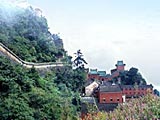 China's south-to-north water diversion project will endanger a huge number of cultural relics at its water sources, thus requiring urgent salvation, archeologists said.
China's south-to-north water diversion project will endanger a huge number of cultural relics at its water sources, thus requiring urgent salvation, archeologists said.
The project is to divert water from the mighty Yangtze River through the eastern, central and western lines to solve water shortage in the country's water-deficient northern areas.
The concern was voiced following the planned construction of the central line of the water diversion project in central China's Hubei province.
"Many cultural relics sites in the Danjiangkou Reservoir area, where ancient culture was highly developed, need rescuing," said Wang Hongxing, director of the provincial Archeology Research Institute.
As the source for the project's central line, Danjiangkou Reservoir on the Hanjiang River, a main branch of the Yangtze River, is scheduled to divert large amount of water to the country's arid northern regions.
With the water level rising from the current 157 meters to 170 meters in 2008, the submerged area will expand to about 370 square kilometers, inundating many sites, containing fossils of dinosaur eggs dating back 60 million years, human skeletons from the Old Stone Age 800,000 years ago, as well as buildings of the Ming Dynasty (1368-1644), according to the Yangtze River Water Resources Committee.
Many of the archeological discoveries in this area belong to the same culture as those salvaged at the Three Gorges, said Wang.
Spread around the reservoir area across central China's Hubei and Henan provinces, many cultural relics, such as ancient aristocratic tombs, need further excavation and protection.
Archeologists were also concerned about the progress of protection efforts as many of the cultural relics, especially the ancient tombs, have been greatly damaged.
"The excavation can't be carried out in full swing because we haven't enough money," said Li Taoyuan, a research fellow with the Hubei Provincial Archeology Research Institute.
Greater efforts to excavate the buried relics and relocate the cultural sites should be made, experts said.
(Xinhua News Agency July 13, 2002)
|

